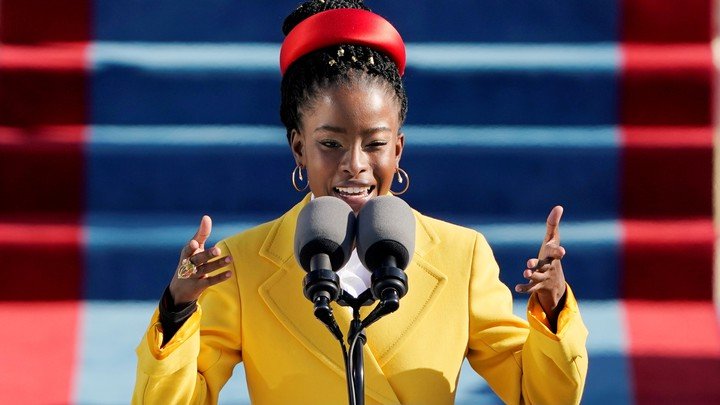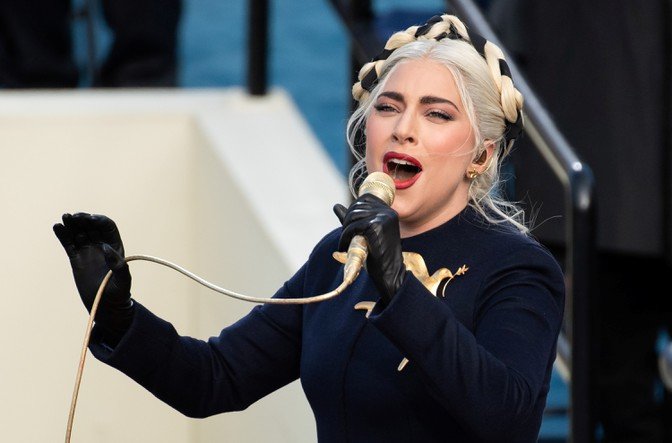The colorful and joyful ceremony didn’t feel like a crisis-era bureaucratic procedure.

American poet Amanda Gorman reads a poem during the 59th Presidential Inauguration at the U.S. Capitol.
Everyone knows that Joe Biden’s presidential aesthetic is purposefully boring: He’s promising a national nap time after Donald Trump’s violent four-year kegger. “Politics doesn’t have to be a raging fire,” the new president said during his inauguration address today, speaking where insurrectionists had recently carried Molotov cocktails. It was natural to expect that Biden’s induction ceremony would make for a few hours as healthfully bland as a Zoom yoga session. (That is, unless you were one of the QAnon followers giddily awaiting the Space Force to intervene in the proceedings.)
Yet the first twist of the Biden era is that the 46th president’s inauguration was rather lit. It felt more like a trippy, tony masquerade than a crisis-era bureaucratic procedure. By the time of the scorching closing prayer by Reverend Silvester Beaman, late-in-a-Marvel-movie sensory overload had set in. Maybe that was because the pandemic added a dose of surreality via mandatory face wear and a flag-peppered National Mall. Maybe the ceremony hinted at a roaring-2020s cultural shift percolating after the grueling, catastrophic 2010s. In any case, the inauguration offered a reminder that the political dream of “normalcy” is a dream not of dullness, but of joy. Skepticism from the right and the left toward Biden’s gauzy rhetoric won’t and shouldn’t go away. But Wednesday was the moment to revel in the mass psychic unburdening that happens when the guy with the nuclear codes doesn’t openly stoke civil war.
After all, despite Trump’s gilded decorative tastes, the last inauguration was a bleak nightmare defined by the word carnage and the groans of 3 Doors Down. By contrast, the 2021 inauguration might persist in the public memory as a whirl of fun fashions: the regal purple of the coat swishing around Kamala Harris; the dusk-hour burgundy of Michelle Obama’s pantsuit; the kitschy zigzags of Bernie Sanders’s mittens; the craftwork sparkles on Ella Emhoff’s shoulders; the glimpse of Dior sneakers behind Amy Klobuchar as she speechified. The event was a musical extravaganza too. Americans know the songs of their patriotic canon plenty well, but they haven’t often heard those songs performed quite like they were performed today. The arts-and-culture establishment—which largely sat out Trump-era ceremonies in protest—was back to flaunt its repressed ridiculousness.

Certainly, any expectations that Lady Gaga would forgo gonzo excess for this sacred gig vanished as soon as she toddled out to sing “The Star-Spangled Banner.” Gaga wanted to give America a feast: She’d braided her hair in the manner of a black-and-white challah; she wore a pouf dress that recalled a red-velvet cupcake; she sported a dove-shaped brooch as enormous as a Chipotle tortilla. (The dove itself snacked on an olive branch.) She then rendered the national anthem in the style of Richard Wagner’s Valkyries, which is really to say in Gaga’s own “Bad Romance” style: guttural, glamorous, serious, silly. When she got to the lyric “our flag was still there,” she turned around and belted to the American flag itself. One might call that maneuver preposterous in any other year, but was it not true that this particular flag persisted through a recent battle to tear it down? For Gaga to bellow any less ferociously, without such tearful commitment, would have been an abdication of duty.
Jennifer Lopez’s performance was, by contrast, a feat of musical restraint—at least for a bit. Singing with a delicate tone, she reworked the cadence of Woody Guthrie’s “This Land Is Your Land”—a collectivist anthem written by an ancestral foil to the Trump family—to give it an adult-contemporary, democracy-is-fragile smoothness. But the military band’s arrangement and Lopez’s voice gathered fervor as the song went on. Then Lopez pulled off a series of sharp escalations: into the bombast of “America the Beautiful,” into a Spanish-language rendition of the Pledge of Allegiance, and into a mantra from Lopez’s own catalog—“Let’s get loud!” Stately reverence had given way to inclusive chutzpah. “That was great,” Klobuchar said, flatly and correctly, when she took the mic after Lopez.
The third headlining slot of the show went to Garth Brooks, the slyly kooky country legend. He’d previously joked about being the only Republican at the inauguration, and his participation was advertised as a small sign that Biden’s calls for unity would not go entirely unheeded. Singing “Amazing Grace” a cappella, with his hat in his hand, Brooks’s almost-angelic affect emphasized the meaning of the lyrics “how sweet the sound.” When he asked listeners—in person and at home—to sing along with him for the final verse, the silence that continued to swaddle him felt psychedelically intense. Maybe the senators in attendance were shy about their voices; maybe they were muffled by their masks. But in any case, this was the moment when the absence of in-person inaugural crowds came into focus. If Biden succeeds in his task to free America from pandemics and seditionists, we’ll be able to sing en masse again.
Gaga, J.Lo, Garth—these are long-established superstars, and their performances made a strong case for why we have normcore, big-tent entertainers (and, maybe, political leaders) in the first place. But the signature art-statement of the day came from a newcomer. Arrestingly decked in canary yellow and cherry red, the 22-year-old poet Amanda Gorman debuted her new work, “The Hill We Climb,” in a flawless five-minute recitation. The poem itself is a hyper-alliterative string of reassuring aphorisms; the most moving passage, about “a force that would shatter our nation rather than share it,” was written after the attack on the Capitol. Really it was Gorman’s delivery—flowing with tidal grace, accentuated by symphony-conductor hand motions—that cast a spell in the manner of great music. “We’ve learned that quiet isn’t always peace,” went one line of her poem. The garish hues and the go-for-broke singing of this inauguration suggested a correlated truth: If we achieve true peace, it might get loud.














